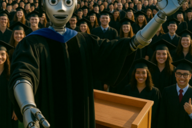You have /5 articles left.
Sign up for a free account or log in.
The New York Times last month reported a story about several politically active students who crossed the line from what the Times called “high jinks” to allegedly committing a federal felony (by breaking into the office of Senator Mary Landrieu of Louisiana to learn whether the Senator’s office was deliberately not answering phone calls). While this criminal activity is nothing short of outrageous, I assume it is an aberration. It is, however, connected to a bigger problem.
These students are part of an organized group of conservative students whose tactics are already well-known on many college campuses: selling cookies at reduced rates to women and students-of-color in protest of affirmative action; sneaking video cameras into classrooms and campus forums and posting out-of-context excerpts, often anonymously, as evidence of liberal indoctrination on campus; hosting a gun raffle; researching and publicizing campaign contributions of faculty members and staff. High jinks? Really? Check the campusreform.org Web site, which advises, “Why take action? Because it will shock your opposition.” Is that why activism matters, to shock and discourage others? Are faculty members and other students “the opposition?”
We need to be clear about what these acts are: attention-seeking tactics that intimidate faculty, students, and guest speakers, distort facts, reduce public issues to simplistic sound-bites, and inhibit the thoughtful exchange of ideas and deliberation, both in and out of the classroom. The students named in the Times are not trying to offset liberal bias – they are trying to prevent learning and chill, if not stop, civil discourse.
Recently, everyday citizens, columnists (including Tom Friedman, also in the Times), newspaper editors, and President Obama have amplified their call for the end of partisan gamesmanship and tactics that promote vitriol, conflict, and stalemates at the national level. It’s time that colleges and universities demand the same of their students.
We know what we should do:
- Create spaces on campuses for better political discourse. When children act out, as my grandmother used to say, it’s because they haven’t been given constructive opportunities to “get the starch out.” Campus venues for public deliberation don’t need to be free-for-alls, like some (not all) of the health care town hall meetings in the fall. They can be structured learning opportunities in classrooms and beyond where students are expected to study an issue and engage in a process of open-minded and reasoned dialogue, respectful communication across differences, and collaborative problem solving. These should be venues where members of the campus community can “call for” dialogue on hot-button public issues. They are also venues where “high jinks” have no place.
- Teach the arts of democracy: It’s no wonder the state of public discourse is so pathetic. Some of the structures that once were places where individuals learned how to behave as citizens in a democracy have broken down (families, neighborhoods, places of worship, newspapers, civics classes). Facilitating, establishing rules for engagement, active listening, issue framing, managing conflict, consensus building, and democratic decision making are skills most students simply don’t have. Campuses can offer certificate programs, weekend workshops and trainings, for-credit programs in intergroup relations and conflict resolution and leadership, and summer institutes. They can support faculty development in dialogue and deliberation as classroom pedagogy. The arts of democracy need to be taught. And they need to be practiced, to become habits on campuses.
- Involve the broader community, not just enrolled students, in discussions about pressing issues. Doing so will increase the likelihood that students will be exposed to a diversity of perspectives. Getting to know, listening to, and learning alongside people with very different life experiences, including those with varied levels of social and political power and privilege, will help students keep an open mind and find solutions they hadn’t previously considered. At the same time, campuses can model a better way to do democracy, teach everyday citizens the arts of democracy, provide neutral venues for informed political deliberation, and serve as catalysts for reasoned, citizen-driven solutions to public problems.
Colleges and universities shy away from political discourse, partly because it is unpredictable and stirs up hornets, but that’s short-sighted and ill-advised. Some students are acting out as a result. And they don’t have to be so timid. Colleges and universities are not “the public square,” nor should they be. They are learning environments, and shocking and intimidating “high jinks” (again, felonies aside) cross a line and disrupt the educational process.
Higher education need to be more intentional about creating places where free, open, reasoned, and respectful speech takes place and where people’s opinions, including thoughtful conservative perspectives, are heard. Perhaps a place to start is with the state of political discourse and activism, on campus and off.




